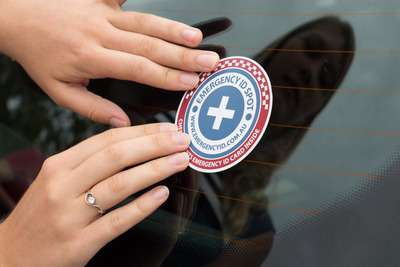Launch of lifesaving Emergency ID Spots
A new patient information program designed to improve emergency care for people involved in car crashes or suffering serious illness at home has been released in Australia, following the success of similar programs in the United States which have been credited with saving thousands of lives.

Emergency ID Spots, which are endorsed by the Westpac Rescue Helicopter Service, are placed on a vehicle’s rear window or the front door of a house to alert police, paramedics and other first responders that a patient’s critical health information can be found inside, either in the glove box, on the sun visor or on the fridge.
The information, such as allergies, prescription medications, previous surgeries, pre-existing conditions and other vital information can ensure the best emergency treatment is administered during the ‘golden hour’ - the first 60 minutes or so after a serious accident or acute health event which can often mean the difference between life and death.
By including a photograph, emergency services personnel can check who the information relates to, while the inclusion of a list of emergency contact and next of kin details mean your loved ones can be informed immediately.
Nicole Graham, founder and director of Emergency ID Australia, said as a former police officer she had come across countless people who were unconscious, disoriented or in so much pain they were not able to pass on critical information to carers.
“Three million drivers reported being in a car accident in the last five years in Australia* - and even in less serious crashes people often go into shock, which means they find it hard to remember important details or communicate clearly,” Graham said.
“If you or your loved ones have a serious allergy to medications, a heart condition, diabetes or epilepsy for example, you can rely on the Emergency ID Spot to tell emergency services that vital information, even if you can’t.”
The Emergency ID Spots have received the backing of the Westpac Rescue Helicopter Service. General Manager Richard Jones said his organisation had thrown its support behind this initiative.
“Armed with immediate information about a patient’s allergies, medications and conditions, emergency services can provide the very best medical care on the spot. We wish everyone had the Emergency ID Spot in their vehicles and in their homes. This simple sticker will certainly help save lives,” Jones said.
Graham said she expected the Emergency ID Spots would be particularly popular with seniors, travellers and grey nomads.
“As people get older they are more likely to have multiple medical conditions, take medication routinely and be more vulnerable to critical injury in an accident, or likely to suffer a serious medical problem at home,” Graham said.
“The Spots are also expected to prove valuable for transport and trucking companies and other professional drivers. They also provide peace of mind for families who need to know their children will receive proper care if the parents are unable to pass on life-saving information.”
Emergency ID Australia will donate 10% of sales of the Spots to the Westpac Rescue Helicopter Service.
)
For further information, visit www.emergencyid.com.au.
Providing mental health support to young workers
Mental health is one of the leading reasons young workers do not finish their apprenticeships...
New psychology division supports organisational compliance
In recognition of the need to protect workers from psychosocial hazards in the workplace, Rehab...
Roof plumber dies after five-metre fall
The death of a 71-year-old roof plumber in October is currently being investigated by WorkSafe WA.







